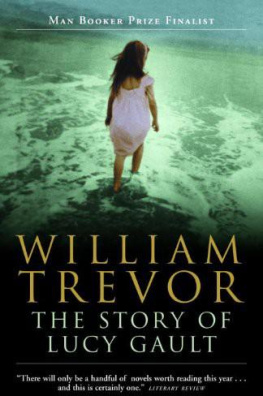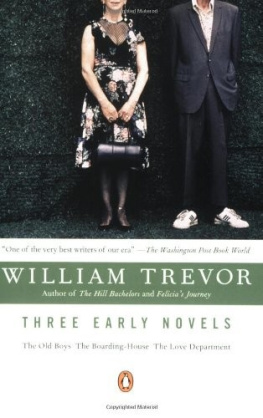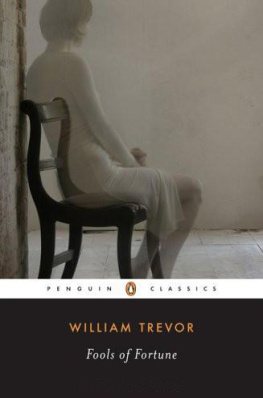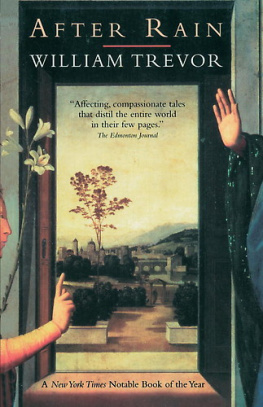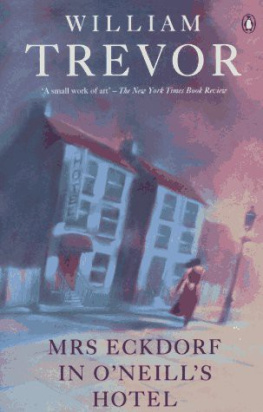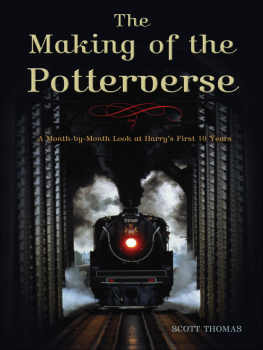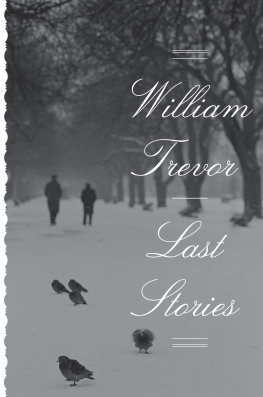THREE
In the new year, workmen began the demolition of the two empty houses in the square and my brothers and I watched from a distance. Stones and bricks were carried away in lorries, the silver-painted railings that had rusted in front of the two gardens suddenly werent there any more.
Oh, the Hun boys dont let the grass grow, my father said, knocking pepper over a plate of sausages in the dining-room. The timber for the new building was to be supplied from our yard, and for that he was naturally pleased, but he had not yet come to terms with Herr Messingers decision to supply a town in which he was a stranger with a cinema. Between moments of attention paid to his sausages, he remarked upon the swift determination with which the German had acted. And isnt it a surprising thing, the way hed have got the money out of Germany?
Did he send for it? my mother enquired, without much interest.
Errah, how could he, for Gods sake? Isnt there a war raging over there?
My mother never seemed offended by such scorn, appearing to accept it as her due, even nodding her agreement with it. But just occasionally, perhaps once or twice a year, her pusillanimity gave way to protest and in the privacy of their bedroom she could be heard spiritedly shouting abuse at my father, calling him uncouth and unclean, bitterly asserting shed rather share a bed with an animal. His own voice in reply was always so mumbling and low that you couldnt hear properly what he said; but his tone suggested that he didnt deny her accusations, perhaps even promised to do better in the future.
Is it she that has the money, boy? Did the woman ever tell you?
I shook my head. I said I had obtained no knowledge of the Messingers financial arrangements, or the source or distribution of their wealth. I was not telling the truth since I knew
Frau Messinger to have been a poor relation, and her husband to be a member of a well-to-do family. None of that seemed anyones business except their own; certainly it was not a titbit to be carried into the back bar of Vineys hotel.
Theres money there somewhere, my father said.
We sat around the dining-room table, all of us eating sausages and fried bread, my grandmothers silently cantankerous with one another, my father airing his views. News he had heard during the days business was imparted at this hour, anecdotes repeated, deaths and births announced.
They were saying in Vineys, he reported now, that theres marble on order for the front steps. Did you ever meet the beat of that, marble steps for a picture house!
Is it the Connemara marble? my mother enquired.
What else would it be? Whats the price of Connemara, Annie?
It was a delusion of my fathers that because she kept the timberyard accounts Annie was conversant with the price of any commodity that had to do with the building trade. Corrugated, Annie? he had a way of saying in the diningroom. What would I give for a three by six? Further resentment in Annie would fester then, her face becoming even heavier in her resistance to all that was being foisted on her. Ah, sure, shes settled in well to the accounts, I had heard him telling a man on the street one day. Sure, what more could she want?
When they have the picture house built, one of my brothers asked, will they charge much to go in there?
My mother told him not to speak with his mouth full of bread because no one could hear him properly. My father, to whom the same objection might have been put, said:
Id say they would. Id say your man would need a big return on his money. What would he charge, Annie, to make sense of the thing?
My sister said she had no idea. Briefly, she closed her eyes, endeavouring to dispose of my father and the ability she had ages ago been invested with as regards swift calculation. My father did not pursue the matter. Completing the consumption of another sausage, he turned to me.
Did you ever find out are they Jews?
Shes a Protestant. They were married in a Catholic cathedral.
Id say you had it wrong.
At that time of my life, harshly judging my fathers opinions and statements, his dress, his clumsiness, his paucity of style, his manner of lighting a cigarette, I found it perhaps more difficult than I might have to forgive him for dismissing the answers I offered to his questions. In retrospect, of course, forgiveness is easier.
That mans not rough enough to be a Catholic, my mother put in.
The squatter of my two grandmothers asked us what we were talking about. In a raised voice my father replied that the man out at Cloverhill was going to build a new picture house for the town. Ive nothing against ajew-man, he said. He has a head for business.
Isnt Colonel Hardwicke out at Cloverhill? my grandmother asked. Running after the maids there?
Colonel Hardwickes dead, my father shouted, and my other grandmother nodded disdainfully. Dead as a doornail, said my father.
My mother cut more bread. She poured tea into my fathers cup. Theres a picture theyre after making in America thats four hours long, he said. Did you hear about that one, Annie?
Gone with the Wind.
Whats that, girl?
The name of the film is Gone with the Wind." It was young Gerrity was telling me when he came into the yard. Id say it was called something else.
Gone with the Wind is the only picture thats as long as that. Its coming to the Savoy in Dublin. Theres people going up to see it.
Cripes! one of my brothers exclaimed with enthusiasm. Wouldnt it be great to be in the pictures for four hours!
Sharply, my mother told him not to say Cripes in the dining-room. She reminded him that shed given a warning in this respect before. My brothers were getting rougher with every day that went by, she said, glaring at both of them.
Mr. Wauchopell knock it out of them. My father confidently wagged his head, at the same time turning it in my direction. He winked at me. Whats that big stick you were telling me about, that Mr. Wauchope has in a cupboard?
I looked at him dumbly, extreme denseness in my eyes. What sticks that?
Hasnt he a blackthorn for beating the living daylights out of any young fellow whod misbehave himself? He released a guffaw, winking at me a second time.
He has a rod for closing the windows with. You cant reach the top part of the windows, I explained to my brothers, so old Wauchope has to hook the end of a rod into them.
Is it Mr. Conron Im thinking of in that case? my father persevered, his hand held up to disguise further winking from my brothers. One of my grandmothers asked him what the matter was, but he didnt answer her. Is it Mr. Conron that lays into you with the blackthorn?
Conron wouldnt have the strength to hit anyone. I paused, leisurely dividing a piece of fried bread into triangular segments. I imagined myself in the box-office, telling people who asked me that Gone with the Wind wouldnt end till one oclock in the morning. Conrons a type of loony, I told my brothers.
My father was taken aback. The grin that had been twitching about his lips gradually evaporated. Before Id been sent to lodge in the rectory he used to read from a letter hed received from the Reverend Wauchope which itemised the attractions of the boarding arrangements for Lisscoe grammar school. Around this same dining-table we had listened to elaborate inaccuracies about well-heated rooms and plentiful supplies of fresh vegetables from the rectorys own garden. The assistant master lodged at the rectory also, the letter said, so that discipline was maintained.
Thats the stupidest thing I ever heard in my life, my father muttered crossly.
A boy from Enniscorthy says Conron was in the loony place they have there. He used to roll a hoop along the road. He thought he was Galloping OHogan.
Next page

